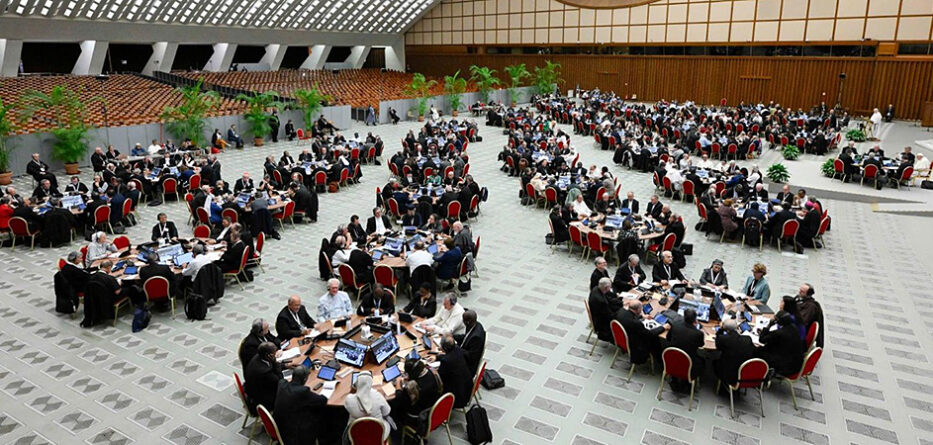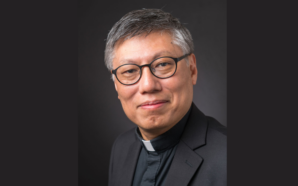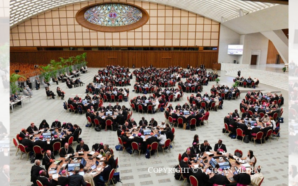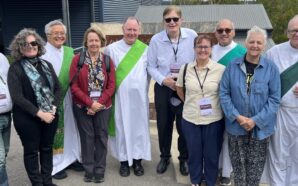The Vatican released July 9 the “working instrument” for the Synod on Synodality. The approximately 30-page document reveals significant changes in the internal decision-making processes of the Catholic Church.
Will the mountain that labors bring forth a mouse? While some fear this, the Vatican nevertheless published a decisive document July 9 regarding the continuation of the Synod of Bishops on synodality. Members of this process, initiated in 2021, are set to meet in Rome next October.
Behind dense and somewhat technical content, the 30 pages of the Instrumentum Laboris (Latin for “working instrument”) focus on governance issues. In March, ten working groups were created to set aside the most publicized questions (female diaconate, welcoming homosexuals, celibacy).
Throughout its 111 paragraphs, the document emphasized the importance of rethinking decision-making within the Catholic Church, encouraging greater participation from all the faithful without altering the authority of bishops. The idea is not to abolish the hierarchical pyramid, but to flatten it somewhat, bringing the top closer to the base.
Four proposed reforms
First Point: The document promotes greater participation of women in church life. Condemning a sometimes “macho” culture, the Synod’s general secretariat recommended “a wider participation of women in the processes of ecclesial discernment.” It also calls for women to have access to “positions of responsibility” in dioceses, seminaries, and training centers and roles as “judges in canonical processes.”
Second Point: The Vatican is considering the development of “lay ministries.” This possibility, already opened by the Second Vatican Council and illustrated in recent years by the creation of catechist, lector, and acolyte ministries, should not necessarily be linked to the “liturgical sphere.” Creating a “ministry of listening and accompaniment” is recommended to consider people “for different reasons, are or feel excluded or on the margins of the ecclesial community.”
The document repeatedly emphasizes the church’s inclusive dimension and considers that laypeople could “contribute to preaching of the Word of God, including during the celebration of the Eucharist.” This development of lay ministries would help alleviate the workload felt by many priests. Rome promotes “a new way of thinking and organizing pastoral action,” leading to a “redistribution of tasks” between priests and laypeople.
Transparency
Third Point: The church must rethink its decision-making process. The identity of the decision-maker remains unchanged: it will always be the bishop in the area. However, “in a synodal church,” “the exercise of authority does not consist in the imposition of an arbitrary will but rather constitutes a moderating force in the common search for what the Spirit requires, as a ministry at the service of the unity of the People of God,” the document states.
In this regard, “discernment,” which is particularly important in Jesuit spirituality, is central to the document (the word appears 50 times). Dioceses should establish more robust consultation processes than currently exist. The text notably opens the possibility for members of various “councils” (parish or diocesan) to be elected, as is already the case in some countries like Italy.
Fourth Point: The final reform to consider is the establishment of transparency in the decisions made by the church hierarchy. This is necessary due to “the loss of credibility due to financial scandals and, even more so, sexual abuse and other abuses of minors and vulnerable persons.” “The lack of transparency and accountability fuels clericalism, which is based on the implicit assumption that ordained ministers are accountable to no one for the exercise of the authority vested in them,” the document highlighted.
To address this, dioceses should, for instance, report their decisions financially and pastorally through an “annual statement on the performance of the mission, including an illustration of the initiatives undertaken in the area of safeguarding (protection of minors and vulnerable persons) and promoting women’s access to positions of authority and their participation in decision-making and taking processes.” This shift in logic will be decided by the synodal fathers and mothers, who will meet in Rome starting October 2.
Reproduced with permission from La Croix International.








